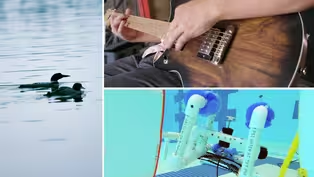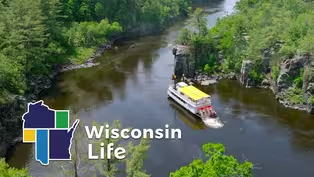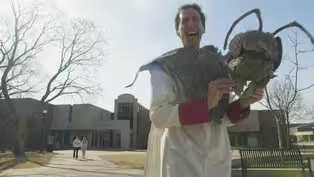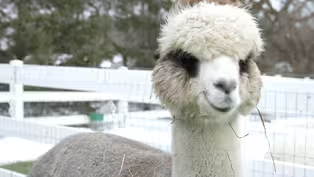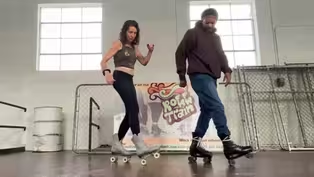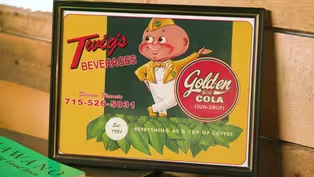
Interstate Park
Season 12 Episode 1 | 26m 48sVideo has Closed Captions
Celebrate the 125th anniversary of Wisconsin state parks at Interstate Park.
Explore Wisconsin’s oldest state park, Interstate Park in St. Croix Falls. Host Angela Fitzgerald ventures along the Pothole Trail, Dalles of the St. Croix River and Ice Age National Scenic Trail. Meet a family bottling up nostalgia at Twig’s Beverage in Shawano, an alpaca farmer in River Falls and a La Crosse insect expert.
Problems playing video? | Closed Captioning Feedback
Problems playing video? | Closed Captioning Feedback
Wisconsin Life is a local public television program presented by PBS Wisconsin
Funding for Wisconsin Life is provided by the Wooden Nickel Fund, Mary and Lowell Peterson, A.C.V. and Mary Elston Family, Leon Price & Lily Postel, Stanley J. Cottrill Fund, UW...

Interstate Park
Season 12 Episode 1 | 26m 48sVideo has Closed Captions
Explore Wisconsin’s oldest state park, Interstate Park in St. Croix Falls. Host Angela Fitzgerald ventures along the Pothole Trail, Dalles of the St. Croix River and Ice Age National Scenic Trail. Meet a family bottling up nostalgia at Twig’s Beverage in Shawano, an alpaca farmer in River Falls and a La Crosse insect expert.
Problems playing video? | Closed Captioning Feedback
How to Watch Wisconsin Life
Wisconsin Life is available to stream on pbs.org and the free PBS App, available on iPhone, Apple TV, Android TV, Android smartphones, Amazon Fire TV, Amazon Fire Tablet, Roku, Samsung Smart TV, and Vizio.
Providing Support for PBS.org
Learn Moreabout PBS online sponsorship- Announcer: The following program is a PBS Wisconsin original production.
- Angela Fitzgerald: Coming up on Wisconsin Life : Meet a family bottling up nostalgia in Shawano, alpacas spreading joy in River Falls, [Kerri laughing] a roller skater sharing his passion with Milwaukee... - So, on this table... - Angela: ...and a La Crosse professor buzzing about insects!
That's all ahead on Wisconsin Life.
[bright music] - Announcer: Funding for Wisconsin Life is provided by: the Wooden Nickel Fund, Mary and Lowell Peterson, the A.C.V.
and Mary Elston Family, the Stanley J. Cottrill Fund, UW Health, donors to the Focus Fund for Wisconsin Programs, and Friends of PBS Wisconsin.
[gentle acoustic guitar music] - Hello, and welcome to Wisconsin Life.
I'm your host, Angela Fitzgerald.
We're celebrating the 125th anniversary of Wisconsin State Parks at Interstate Park.
It's the oldest state park in Wisconsin, founded in 1900.
Not to be confused with Interstate State Park in Minnesota-- our park sits in Polk County overlooking the Dalles, the narrow gorge the St.
Croix National Scenic Riverway runs through.
[bright music] The views from the park are expansive.
Used as a transportation route by Indigenous people, the riverway was later utilized by loggers.
However, this narrow gorge caused massive log jams, most notably an 1886 log jam estimated to be 7 miles long, only to be cleared by dynamite, steamboats, and hours of labor.
A few years later, working to preserve the distinct scenery and rock formations of the area, advocates in both Minnesota and Wisconsin worked to establish the state parks we see today.
Visitors can also check out the Ice Age Interpretive Center to learn more about the glacial formation that carved this land and the animals that roamed it.
We'll also roam this park later in the show, but let's jump into our first set of stories.
As we head to Shawano to meet a family bottling up a taste of Wisconsin's past.
[bright music] If you grew up in Shawano County, there's a good chance you've heard of Twig's.
And if you grew up in Wisconsin, there's an even better chance your childhood included Sun Drop soda.
- Dan Hartwig: Sun Drop came out in the early '50s.
It's the first gold drink, the golden cola that was on the market.
- Angela: Dan Hartwig's family knows a thing or two about this citrus soda.
Just ask Ben.
- Ben Hartwig: Before Sun Drop was actually even a soda, it was considered a lemonade.
And that's why you see them call it the "golden cola."
And then in 1953, Sun Drop was introduced to us.
- Most people think that we invented it, but actually it was invented by guy named Charles Lazier out of St.
Louis.
- He asked my grandpa if he wanted to bottle and distribute Sun Drop up in this area.
And it's been our most popular product since.
- Angela: But in order to get the full story behind this bottled beverage... - Jake Hartwig: Twig's has a vast history in Shawano.
- Angela: ...you have to go back three-quarters of a century to a man they call Twig.
- Ben: My grandpa, Floyd Hartwig, started the business.
- Diane Hartwig: Twig's was founded by my father-in-law in the early '50s.
Then in 1986, my husband and I bought it from his father.
- I always worked with my dad, and I got to know him as good as anybody.
And we came up with this idea.
- They always called him Twig, that was his nickname.
So they decided to call the business Twig's Beverage.
- Angela: Ever since Twig started the business, the Hartwigs have had a heart for Shawano.
- My father, he grew up in Shawano, just like all of us.
It's a great place to live.
- Jake: I'm proud of staying in a small town, staying in Shawano, being local.
Twig's gives us that opportunity.
- Angela: And there's something else about this area that Twig's tapped into.
- Yeah, Shawano water, it's just the greatest water.
There were two big breweries in town and maybe three bottling companies.
These guys came to Shawano to start their factories just because of the water.
We actually started bottling the water.
- Angela: In addition to water and Sun Drop, Twig's also bottles its own brand of sodas.
- We're known for a lot of our Twig's flavors.
Root beer, black cherry, blue raspberry.
Those are our more popular ones.
- People will come in with 10 to 40 cases that they'll need refilled, and they come from all over with their pickup trucks and their vans, and they may bring it to their homes or to their cabins.
- Angela: This family business occupies a place in Shawano history.
[Dan laughing] Today, the Hartwigs' family is preserving Twig's history one bottle, one case, and one memory at a time.
- It's unique.
I don't think there's anywhere like it.
- Ben: Over here, you'll see a lot of different advertisements that we've had.
It's kinda cool nowadays, people say, like, "Oh, yeah, we used to have this Sun Drop sign on our bar, restaurant, or grocery store."
- Angela: Twig's is a true sign of the times that continues to attract visitors from near and far.
- I think what draws a lot of people here is that they want to come and see live bottling.
[bottles clanking] - We're the last returnable bottler for Sun Drop in the world.
Some individuals like it 'cause of the nostalgia feel that it gives from drinking soda from a glass bottle.
- Angela: For fans of those glass bottles... - Seventy-nine.
- Angela: ...they are all stamped with a date when they first hit the production line.
- Eighty-five.
So those are old ones.
- Angela: Through the years, the bottom line of bottling has always been family.
- I love being part of the family business, you know?
It's great to see where we've started and where we've come to now.
- It's something that I think about all the time.
I'm proud that Twig's has been able to stay local.
I wouldn't trade it for anything.
- They say family businesses are the salt of the earth, kind of the backbone of small communities.
And especially in a town like Shawano, it's very true.
There's nothing else like it.
- I've stayed here all my life.
I've been working here for 54 years.
I don't plan on leaving unless my boys kick me out.
I'm proud that they're still sticking around.
[laughter] - Angela: Now, we visit a River Falls farm where alpacas and other furry friends are spreading joy.
[bright acoustic guitar music] - Kerri Harting: When people drive onto the farm, there is something magical.
If I wouldn't have the farm... Do you wanna give me a kiss?
... I know I wouldn't be the person that I am today.
I'm Kerri, and I'm the owner of Eagle Eye Farm.
I was working as a radiologist in St.
Louis, Missouri, and Dawn, my wife, had been working in health care for about 32 years.
And we just decided that the monotony was too much for us.
In August of 2018, we went to an alpaca farm.
We had just wanted to go do something fun with the kids.
It was pretty shortly after that, I'm talking like a day or two, that Dawn and I decided we wanted to get into alpacas.
[bright acoustic music] We're right between Hudson, Prescott, and River Falls in western Wisconsin.
It's a great area.
So we had 20 alpacas, we had 2 pigs, and we had chickens.
[chicken clucking] We brought in the Valais Blacknose sheep.
We also purchased two llamas.
We added goats, and then we added prehensile-tailed porcupines.
And then you have to have the Highland cattle because they have the gorgeous horns.
Dawn had always known that she had wanted to do agrotourism.
Agrotourism is simply the act of having people come to your property and showing them about agriculture.
So Dawn was very adamant that she wanted people to know where food came from.
We do not eat any of our animals that we have here, but she wants kids to know that you don't just go to the grocery store and pick up your food from there.
There's really a whole process that happens before that.
I think everything just kind of, just fell into our lap.
It was just as if it was meant to be.
[pig snorting] In 2023, Dawn was at an alpaca show in Michigan.
She told me when she was there that she wasn't feeling well.
The feeling did not go away.
And I just said, "So I'm gonna meet you at Hudson Physicians," and she said, "Okay."
And at that point, I knew that I was in trouble.
They determined that she was having a heart problem.
Ended up eventually at the university on life support.
Was on life support for three and a half weeks, and then passed away.
This farm was really hers.
So she was in charge of all of the animal care, taking care of the animals day by day.
I would take care of the finances, I would take care of the website, I would take care of the store.
And she did everything else.
And so then, we're stuck with, I've lost my wife, I've lost my best friend, I've lost my business partner.
I am like, "What am I going to do?"
So I have two kids, I have the farm, I'm still working full time.
How am I gonna manage all of this?
I looked at downsizing, and really, the only decision that made any sense was to stay here.
There you go, bud.
C'mon, let's go get some food.
I knew that my time here wasn't done.
I still have a purpose here on the farm, and I wanted to make it work.
It's the best decision that I've ever made.
[laughing] I'm still in the grieving process.
It's been a year and a half, almost two years.
It's, I don't like to think about it a lot, so I just keep myself busy.
What I do is I wake up somewhere between 5:30 and 6:00, and I have two kangaroos that live in the house, and so I feed them.
By 7:30, we're out here doing chores.
So we pick up all of the poop.
You have to make sure that they have food, so we give our alpacas pellets.
They have free choice hay, so we have to refresh their hay.
And then, of course, fresh water.
[water splashing] And so, the chores take anywhere from two, two and a half to three hours to do.
We do them as a group.
Hopefully, we start having some visitors that come and we start doing tours.
And so, yeah, it stays pretty busy.
I could not do this without my staff.
So I have really great staff that work here that I trust immensely.
I am so appreciative for the fact that they're supportive of me.
You know, I can't see myself moving.
I just honestly can't.
You know, I think I'll probably be here until I'm no longer here on Earth.
I truly enjoy the experience of having people around me.
I love the animals.
I find this very fulfilling.
[laughing] That's good video!
It's all about love.
It's all about caring for each other and caring for nature, and really doing the best that we can for people and animals and the Earth.
- We're on the trails at Interstate Park, on the hunt to learn more about how the Ice Age shaped this layered landscape.
To do that, Natural Resource Property Supervisor Matthew Densow met me in the Ice Age Interpretive Center.
- Matthew Densow: So, Interstate Park is a very, very unique property in that we are the oldest property in the state of Wisconsin.
We have over 1,300 acres, and our major feature that we protect are the Dalles at the Saint Croix and the glacial potholes that we have here.
We have 82 standard campsites along with 2 group campsites.
We have a very nice swimming beach that's on the Lake O' the Dalles.
We have over nine miles of hiking trail within the park.
With the Ice Age Interpretive Center, it allows people to kind of travel back in time and experience what the area really kind of looked like, and then physically going on the pothole trails, imagining where the water was and how the potholes formed really kind of helps people transport back in time.
So there's lots to see and do here at Interstate.
- So, I understand there are technically two Interstate Parks.
- So there is a Wisconsin Interstate and then there's a Minnesota Interstate Park.
So we're the bigger, better one.
You know, we have more to offer, more to see and do.
There are some differences.
They're definitely both good properties to go and visit, but I'm gonna definitely advocate for our side.
- I'm all for friendly competition, so encouraging everyone to get outdoors, and they can option into the Interstate Park on the Wisconsin side, but clarifying the Interstate State Park is on the Minnesota side.
- Correct.
- See both, but come here first.
- Exactly.
- Okay.
[both laughing] Thanks, Matthew.
- Thanks.
- Angela: So I understand there's a unique anniversary taking place this year, the 125th year of the park.
Can you tell us about that?
- Definitely.
In September 20 of 1900, the first parcels of land were purchased here for Interstate Park.
So this year is the 125th anniversary of Interstate Park, but also the entire Wisconsin state park system, which has grown from Interstate to 50 state parks, fifteen state forests.
Fourty-four state trails, nine recreation areas, eight water resource areas, over 6,000 campsites, 1,500 buildings.
It's grown to what you see today.
- Would you mind showing me some more about the park?
- Yeah, definitely.
Let's go for a nice little hike.
- Angela: From the center, we headed to the Pothole Trail to get a look at the ancient rock formations this park offers.
- Matthew: So, if you can imagine when everything was melting with the last glaciation, there's a whole bunch of water that was coming through this area.
Water was coming through really fast, and there's lots of things that got caught in the water.
Some of the ones that we find are called grinders.
- Oh, wow.
- And this is a small example of one that we have here.
Well, you get a whirlpool that forms, and then it drills into the rock itself.
- Oh!
- And that's how we form glacial potholes, which we have very fine examples here at Interstate Park.
So one thing that makes potholes special, and you can tell it's a pothole, is that the surface inside is smooth because you can tell that it's been worn out.
- I now have a more positive association with potholes than what I came into this conversation with.
- Great.
It's a fun feature, isn't it?
- Absolutely.
Something I never thought I'd say, I have a newfound admiration for potholes.
- So, this is the Dalles.
- Angela: And for the majestic views found at Interstate Park, on the Wisconsin side.
Let's skate into our next story to meet up with a Milwaukee nonprofit keeping a vibrant, deep-rooted tradition rolling.
- In a sunny Milwaukee loft, a class learns new ways to move.
[upbeat disco music] - Terrence Clarke: We advertise ourselves as a fitness class.
But it's really about the culture, promoting the culture.
We exist to promote Black culture roller skating.
We exist to teach it to people that don't know about it.
So that's how Roll Train got started.
- Angela: Roll Train is a roller dance studio and organization headed by Terrence Clarke and partner Ellen Fine.
- Terrence: Here, we're gonna teach you how to do it, how to balance yourself, how to fall, you know, how to get up.
- Angela: For Terrence, skating's been an interest since childhood.
- Terrence: Johnson's Skate Palace was on 76th Street.
A lot of times, we didn't have a ride to the skate rink, so we would skate all the way to the rink and then we'd have to skate all the way home.
[bright brass music] - Angela: But he also knows the Black culture skate tradition goes back much longer as a pastime.
And passion.
- Terrence: Skaters have been skating since way before the civil rights movement.
- Angela: During the civil rights movement, roller rinks were one more white-dominated space to fight to integrate.
But the joy that Black skaters found couldn't be stopped.
- Terrence: And it's always been like a stress relief, a way to express themselves, a way to connect with community.
- Angela: And it's been a way to express a unique style.
- Terrence: It's a style that nobody else gave us.
It's a style we created.
This is really like an art form.
♪ Whoa, I feel good ♪ [funky music] - Angela: At the heart of Terrence's skating is what's called JB style, named for the dance moves of musician James Brown.
- Terrence: JB is a lot of footwork, a lot of stunts.
♪ Like this ♪ [upbeat music] - Angela: Different skate communities have evolved their own ways of moving.
- Terrence: Every city has their own little thing.
St.
Louis, Atlanta, Detroit.
- Angela: The different forms are shown off at huge skate parties.
- Terrence: People from all over the country are going to these parties.
You go to these parties, it's nothing but love.
♪ No one can stop this, stop this, stop this, stop this ♪ - Angela: Back home in Milwaukee, getting respect for these skating styles has once again been a challenge.
At Red Arrow Park, Roll Train led the charge to open up the ice rink to off-season skating.
- So for 10 years, going back and forth with the county, just to open the gates so we can skate there.
And they kept giving us many, many excuses.
- Angela: At last, Roll Train succeeded and the gates were opened.
[upbeat funk music] - Terrence: Finally, we got it activated for roller skating.
That was a long fight.
- Angela: Just one more way for Roll Train to preserve and promote Black culture roller skating.
- Terrence: A lot of our skaters at Roll Train are not Black, but they see and they feel what skating does for them.
We've gotten lots and lots of stories about how since they've come to the class, you know, their life has changed.
- Angela: Changing lives and sharing his culture keep Terrence rolling along.
- As long as I don't stop moving, I'm gonna keep skating.
[upbeat funk music] - Angela: For our last story, we're bugging out as we join a La Crosse professor celebrating the little creatures that surround us.
[grunts] - Barrett Klein: Take one.
- Videographer: And then try talking, Barrett.
- Orthoptera, Diptera, Lepidoptera, Hymenoptera, Trichoptera.
Notice they all end in "optera," Greek for "wing."
Coleoptera, beetles.
From a weevil to a ground beetle.
Here, we've got burying beetles and other carrion beetles.
Goliath beetle, the most massive insect on the planet.
Insects.
The grand diversity, variety, not only in shape, color, form, but behavior has always inspired and excited me.
I'm Barrett Klein, entomologist, entomoartist, animal behaviorist, and professor of biology at University of Wisconsin-La Crosse.
[quirky music] I like to share my food with the roaches.
Let's see.
Now, they love bananas.
Chowing down!
So it's tempting to swat, slap, and dismiss or repel insects.
- Advertiser: Flying insect killer: kills bugs dead.
- It takes a little bit more effort to observe, not just tolerate, but celebrate insect involvement in our lives.
Pollination, decomposition, nutrient dispersal, soil aeration.
Our lives depend on them.
Let's find that winner of a drawer.
Hey, what are they doing here?
Excuse me.
When I was five years old, I found a dead butterfly on my parents' driveway, and I was thrilled because to a child, to well, to anybody with open eyes and an open mind, the beauty was exhilarating.
I could hold that accessible, exquisite organism, and I felt really privileged.
And I knew at that point, I had this nebulous epiphany that insects would be at the core of my existence.
So, when I was asked to write a book, I titled it The Insect Epiphany because every day, there's a new epiphany as to how insects influence our lives.
Cultural entomology, or how insects have affected human culture across the world and throughout history.
[groovy music] On this table, you see insects in comic books, and then stamps from across the world.
Products like cochineal.
The dried bodies can form this lustrous red.
Entomophagy, the eating of insects.
High in calories, as well as micronutrients and protein.
Pupae, crickets, grasshoppers, mealworms, larvae.
From Korea, we've got silkworm moth pupae.
Not my highest recommendation.
Insects as costumes.
Here's my sketchbook designing that number.
So when Halloween comes up, I must have an insect helmet.
A bald-faced hornet nest with entrance as the mouth, and a gaping hole revealing a brood cone.
Paper wasp helmet, silk tunic and wings, cochineal sleeves, paper chest shield.
- Producer: Why, why, why do you do it?
[Barrett laughing] My reason for involving insects, it affords me a greater intimacy with the arthropods I love.
But also, I find art is an easy, fun, often inspiring way to communicate to fellow humans the value of insects.
To explore this intimate connection we have with insects, that's what's really exciting to me.
[laughing] - We've traversed Interstate Park, celebrating 125 years of state parks in Wisconsin, all while sharing stories of people's lives.
For more, visit WisconsinLife.org.
Connect with us on social media or by email at stories@wisconsinlife.org.
'Til our next rockin' adventure, I'm your host, Angela Fitzgerald, and this is our Wisconsin Life.
Bye!
[birds singing] [gentle music] - Announcer: Funding for Wisconsin Life is provided by: the Wooden Nickel Fund, Mary and Lowell Peterson, the A.C.V.
and Mary Elston Family, the Stanley J. Cottrill Fund, UW Health, donors to the Focus Fund for Wisconsin Programs, and Friends of PBS Wisconsin.
A new season of Wisconsin Life is coming this fall
Preview: S12 Ep1 | 30s | Loons, robots and electric guitars. The new season kicks off on October 9. (30s)
Preview: S12 Ep1 | 30s | Celebrate the 125th anniversary of Wisconsin state parks at Interstate Park. (30s)
Wisconsin's oldest state park reveals Ice Age geology secrets
Video has Closed Captions
Clip: S12 Ep1 | 3m 27s | Angela Fitzgerald explores Interstate Park's Ice Age geology and 125-year history. (3m 27s)
UW-La Crosse entomologist's 'epiphany' reveals our bonds with bugs
Video has Closed Captions
Clip: S12 Ep1 | 4m 41s | Lifelong insect enthusiast Barrett Klein explores our human bonds with bug life. (4m 41s)
Eagle Eye Farm brings alpaca farm magic to River Falls
Video has Closed Captions
Clip: S12 Ep1 | 5m 26s | Farmer Kerri Harting wants to spread the joy of animals and farming through her alpacas. (5m 26s)
Roll Train preserves Black skating culture
Video has Closed Captions
Clip: S12 Ep1 | 3m 47s | Milwaukee's Roll Train teaches JB style skating while preserving Black culture. (3m 47s)
Video has Closed Captions
Clip: S12 Ep1 | 4m 21s | Twig's has been a family-owned bottler of Sun Drop and craft sodas for more than 75 years. (4m 21s)
Providing Support for PBS.org
Learn Moreabout PBS online sponsorshipSupport for PBS provided by:
Wisconsin Life is a local public television program presented by PBS Wisconsin
Funding for Wisconsin Life is provided by the Wooden Nickel Fund, Mary and Lowell Peterson, A.C.V. and Mary Elston Family, Leon Price & Lily Postel, Stanley J. Cottrill Fund, UW...
